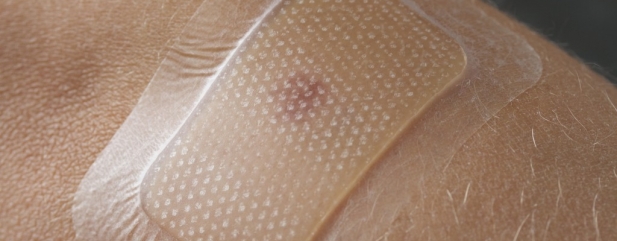Archived article
Please note that tax, investment, pension and ISA rules can change and the information and any views contained in this article may now be inaccurate.
Scapa’s smart new strategy could deliver big upside

Bonding solutions specialist Scapa (SCPA:AIM) is worthy of closer attention thanks to an intriguing new technology transfer strategy
to support growth in its healthcare division.
Scapa supplies bonding solutions and manufactures adhesive-based products for the healthcare and industrial markets.
Its industrial division accounts for approximately 60% of sales and focuses on adhesive components for a range of tapes for cable wrapping and packaging.
The healthcare division generates 40% of sales, partnering with market leaders to design, develop, manufacture and commercialise skin-friendly adhesives for wound care and medical devices.
WHAT IS A TECHNOLOGY TRANSFER?
Under its new strategy, Scapa plans to use so-called technology transfers where it buys a manufacturing site or a unit at a depreciated value from a client. It also receives a manufacturing contract on behalf of the client.
Scapa is taking advantage of more pharmaceutical companies outsourcing services, allowing them to focus on other areas such as marketing and branding.
Technology transfers will help Scapa acquire more capacity and increase production without significant outlays of capital.
It could also lead to recurring revenues by encouraging customer loyalty and speeding up product development times.
Over the last year, Scapa sealed technology transfers with a wound care business and a global consumer product firm.
WHY SPENDING £25m A YEAR COULD YIELD 30% UPSIDE
Berenberg analyst Benjamin May speculates £25m of spending on technology transfers every year could yield ‘at least 30% upside’ to his estimates for Scapa over the next three years.
On the back of forecast-beating annual results, May upgraded earnings before interest and tax (EBIT) expectations by 1% in 2019 and 2020 to £38.1m and £40.6m, respectively.
For 2021, EBIT is anticipated to jump 7% to £43.1m. Forecasts for sales, earnings per share and dividends were also hiked over the next three years.
Scapa trades on a 21.8 times forecast earnings per share (EPS) for the year to 31 March 2019 and so isn’t cheap.
If the stock hits the 520p target price set by Berenberg the PE ratio would be 26.8 times, at current EPS estimates. We believe such a premium rating is justified based on Scapa’s good track record and growth strategy.
Further levers for growth include organic gains and M&A, as well as manufacturing efficiencies and upselling in the industrials division.
Berenberg argues Scapa can benefit from reducing changeovers in manufacturing lines and upselling services to its larger clients.
Important information:
These articles are provided by Shares magazine which is published by AJ Bell Media, a part of AJ Bell. Shares is not written by AJ Bell.
Shares is provided for your general information and use and is not a personal recommendation to invest. It is not intended to be relied upon by you in making or not making any investment decisions. The investments referred to in these articles will not be suitable for all investors. If in doubt please seek appropriate independent financial advice.
Investors acting on the information in these articles do so at their own risk and AJ Bell Media and its staff do not accept liability for losses suffered by investors as a result of their investment decisions.
Issue contents
Big News
- BT in charm offensive to get investors back onside
- Markets are climbing the ‘wall of worry’
- Battle for control at Stobart and Petropavlovsk
- What does the Government sale of RBS stake mean for investors?
- Why Hotel Chocolat continues to be a sweet investment
- Bodycote boom time raises the fear of inevitable bust

 magazine
magazine










